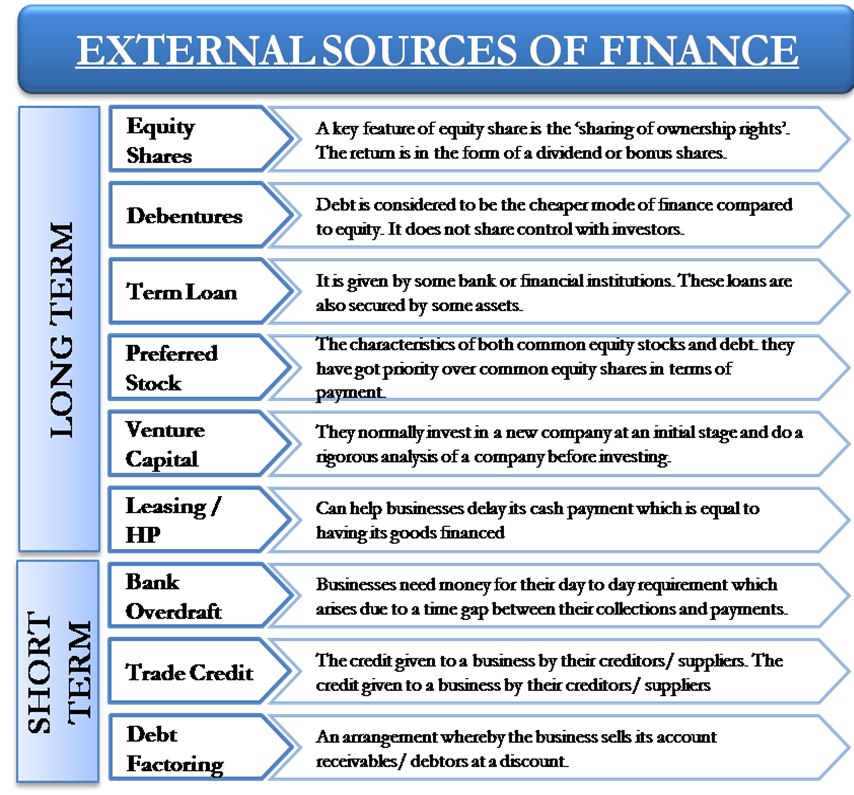The term ‘External Source of Finance / Capital’ itself suggests the very nature of finance/ capital. External sources of finance are equity capital, preferred stock, debentures, term loans, venture capital, leasing, hire purchase, trade credit, bank overdraft, factoring etc. By external sources, we mean the capital arranged from outside the business, unlike retained earnings which are internally generated out of the activity of a business.
External sources of finance are those sources of finance which come from outside the business. For example, retained earnings are an internal source of finance whereas bank loan is an external source of finance. We can segregate external sources of funds between long-term sources of finance and short-term sources of finance.
LONG-TERM SOURCES OF FINANCE
EQUITY SHARES
Equity shares are a common source of finance for big companies. Not all the businesses can use this source as it is governed by a lot of legislation. A key feature of equity share is the ‘sharing of ownership rights’ and therefore, the current shareholders’ rights are diluted to some extent.
It is considered costly compared to debt finance because the return in the form of a dividend or bonus shares offered to shareholders is not tax deductible. Also, it’s not easy to raise this capital as it requires a lot of legal formalities to be complied with and above all, the investors should have faith in the company.
DEBENTURES
Debentures are another common means of finance used by companies who prefer debt over the equity. Debt is considered to be the cheaper mode of finance compared to equity. It does not share control with investors. It is because the interest paid to debenture holders is tax deductible. Rest of process of debentures issue is similar to equity issue. It is offered to the common public and therefore necessary legislations need to be complied with. Debentures also involve some cost of issuing and they are collateralized by some assets of the company.
TERM LOAN
The characteristics of a term loan are very similar to debentures except that it does not include too much cost of issuing because it is given by some bank or financial institutions. The common public is not involved in it. A rigorous analysis of company’s financials and future plans is done by the bank to judge the debt servicing capacity of the company. These loans are also secured by some assets.
PREFERRED STOCK
The preferred stock shares characteristics of both common equity stocks and debt. They are called preferred because they have got priority over common equity shares in terms of payment of dividend and the capital also at the time of liquidation. A special kind of preferred shares called cumulative preference shares has its dividend accumulated until it is not paid. The payment of such a dividend can be delayed but cannot be ignored.

VENTURE CAPITAL
It is same as equity shares except that the investors are a different set of people. Commonly known as venture capitalists, they normally invest in a new company at an initial stage and do a rigorous analysis of a company before investing. Venture capitalists exit the firm once it starts getting a good valuation.
LEASING AND HIRE PURCHASE
Choosing hire purchase or lease as an option over paying the full amount to the supplier of goods can help businesses delay its cash payment which is equal to having its goods financed. Normally, the hire purchase option is provided by suppliers of big machinery or bank becomes an intermediary at times. Both lease and hire purchase to provide the buyer with an option to purchase the asset at the end of its term.
SHORT TERM SOURCES OF FINANCE
BANK OVERDRAFT
Bank overdraft is a simple mode of short-term financing. Businesses need money for their day to day requirement which arises due to a time gap between their collections and payments. To fulfill such requirements, bank overdraft is an ideal short term source of finance.
TRADE CREDIT
Trade credit is nothing but the credit given to a business by their creditors/ suppliers. It allows a business to delay its payments for some period. The period of credit depends on the credit terms between the business and the suppliers.
FACTORING IN DEBT
It is an arrangement whereby the business sells its account receivables/ debtors at a discount. In this arrangement, the buyer, who is known as the factor, collects the money from the debtors on behalf of the business and charges a premium for this service. If the debtor does not pay for any reason, the factor can get back to the business for the payment.
